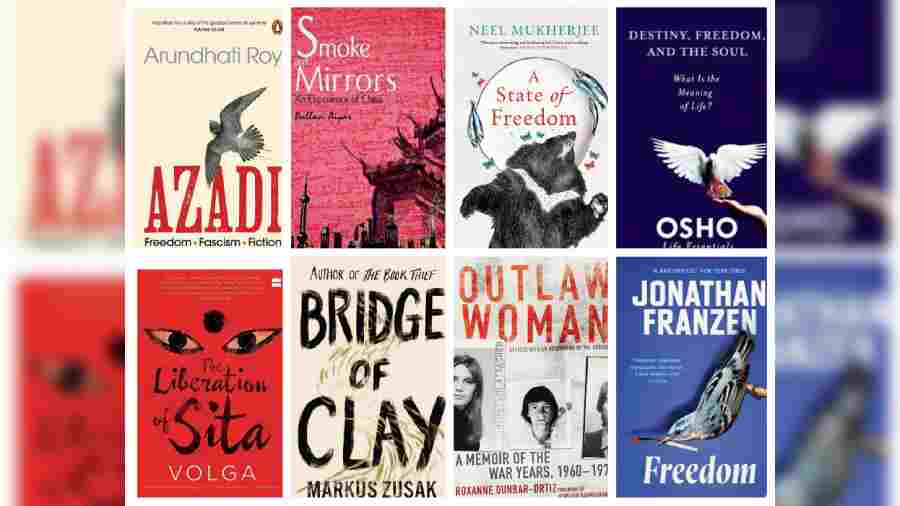Azadi by Arundhati Roy
Without Arundhati Roy’s book Azadi, any discussion of literature on freedom would be incomplete. Her collection of essays portrays an environment of “constant and incessant danger”, and Roy has refused to back down and this book, which takes its title from the Urdu word for “freedom”, aims to keep the Kashmiri predicament in her worldwide readership’s consciousness. The lines, “Does a country fall into fascism the way a person falls in love? Or, more accurately, in hate?”, are extremely pertinent to the times we are living in.
Smoke and Mirrors by Pallavi Ayyar
This book portrays the dynamics between China and India. In many respects, China and India are each other’s alter egos, and this mirroring reveals the flaws and successes of both civilisations. As well as looking at differences and similarities between individuals on either side the Himalayas, this book also looks at biases and misunderstandings that exist between the two sides of the mountain range. The book by a Mandarin-speaking Indian journalist on China is a blend of travelogue, reporting and memoir. She writes, “The two countries were like mirror opposites of each other. One provided roads, schools and electricity but stifled diversity, criticism and participation; the other allowed diversity, criticism and participation, yet achieved little in improving livelihoods and providing economic opportunities.”
A State of Freedom by Neel Mukherjee
Mukherjee’s book remedies us of our orthodox views and replenishes our minds with his views on the importance of living one’s life to the fullest, regardless of one’s financial or social standing. A sense of connectivity exposes the author’s insight into how Indian society should function in general, as well as how Indian families and their neighbours operate in context. He illustrates the brutality, violence, and despair of class structures brilliantly. He writes, “After all, we make ourselves according to the ideas we have of our possibilities.”
Destiny, Freedom, and the Soul by Osho
The most crucial issues in a person’s life are covered in the Osho Life Essentials series. Part of it is Destiny, Freedom, and the Soul. Brilliantly penned and articulately delivered to the soul, Osho’s book discusses the vital questions and solutions to liberating our mind from restrictions and prejudice. Osho writes, “Do what your nature wants to do. Do what your intrinsic qualities hanker to do. Don't listen to the scriptures. Listen to your own heart. That is the only scripture I prescribe.”
The Liberation of Sita by Volga
Mythology re-imagined, The Liberation of Sita by Volga stands out in this list as one of the most unique pieces on liberation and a sense of self- attainment. With Sita from the Ramayana as the protagonist, the book has tales of women such as Renuka Devi and Urmila who encounter each other in the book’s short stories. These ladies symbolise singlehood in different ways and they provide courage to Sita to overcome her misery, which is precisely what these stories are about. By refusing to bow down to external authority, Sita had fully experienced, for the first time, the inner power of self-authority.
Bridge of Clay by Markus Zusak
Bridge of Clay, another brilliant book on freedom of self, focuses on Clay Dunbar and his four brothers — Matthew, Rory, Henry, and Tommy — who struggle to come to grips with their father’s abrupt arrival after the death of their mother. A line from the book reads, “There are hundreds of thoughts per every word spoken, and that’s if they’re spoken at all.” Loss is a recurring motif in Bridge of Clay, whether it comes in the form of demise or removal. His mother’s death, his father’s absence, and the death of the love of his life, Carey Novac, are all losses that Clay experiences throughout his life. He fights till the end to attain liberation from his pain and struggles.
Outlaw Woman by Roxxane Durban Ortiz
Roxanne Dunbar-Ortiz was a founding member of the Women’s Liberation Movement in 1968, which has been referred to as the second wave of American feminism. No More Fun and Games was published by her and a small group of determined women in Boston, and it was the first women’s liberation magazine. In her book Outlaw Woman she documents the war years from 1960-1975, which were intertwined with FBI counter-insurgency activities and intra-left debates over tactics and philosophy. In the 1960s, Dunbar-Ortiz admits, that the Left didn’t triumph, but it did challenge patriarchy and imperialism in a new and crucial manner, which was revolutionary.
Freedom by Jonathan Franzen
From the carefree abandonment of youthful yearning to the sobering compromises of middle age, the price of suburban expansion to the weight of riches, the pleasures and obligations of freedom are depicted in the book Freedom.
